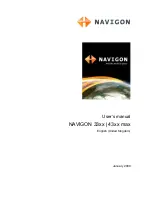
SF-2050 User Guide - Rev. E
As CAN Bus specifications are diverse, drivers for the
existing hardware must be tailored to the specific
manufacturer’s equipment being interfaced to. For
further information, e-mail NavCom Customer Support
at
.
Event
The SF-2050M also can utilize an event input pulse to
synchronize any external incident that requires precise
GPS
time tagging, such as aerial photography. In this
case, the action of a camera’s aperture would output a
pulse to the
Event
port and have the receiver output
position and time information relative to when the
photograph was taken.
Specifications:
-
50 Ohm input impedance
-
3Vdc > Input Voltage, High < 6Vdc
-
0Vdc < Input Voltage, Low < 1.2Vdc
-
Minimum pulse width, 100nsec
-
Rising or Falling edge Synchronization
Connecting the shared EVT MKR/CAN BUS port
requires a five core, 5mm diameter, cable fitted with a
LEMO
plug, type FGG.0K.305.CLAC50Z, plus strain
relief, NavCom P/N 94-310062-3003.
Detailed specifications of the
Event
Input and cable
wiring and how to configure the Event input may be
found in Appendix D of this User Guide.
2-23
Summary of Contents for GPS Products
Page 2: ......
Page 12: ......
Page 20: ...SF 2050 User Guide Rev E Figure 2 SF 2050 Front View Figure 3 SF 2050M Only Back View 2 18...
Page 41: ......
Page 43: ...SF 2050 User Guide Rev E Satellite Based Augmentation System Signals WAAS EGNOS StarFire A 41...
Page 51: ...SF 2050 User Guide Figure C1 StarFire Network C 49...
Page 55: ......
















































